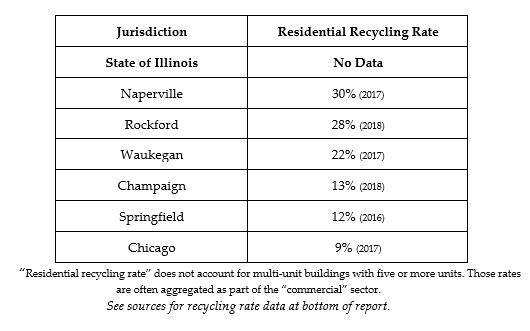The State of Recycling in Illinois
Recycling rates in Illinois reveal one of the most wasteful states in the nation, headlined by Chicago’s dismal 9 percent residential recycling rate (see table below). Even Naperville, which boasts the highest rate among the most populous Illinois cities at 30 percent, falls below the national average of 34.7 percent. Due to a lack of mandated reporting in certain jurisdictions, the state’s overall recycling rate is unclear. However, given low rates in cities with available data, evidence from other states suggests that Illinois’s statewide rate is much lower than the national average.
Downloads
Recycling rates in Illinois reveal one of the most wasteful states in the nation, headlined by Chicago’s dismal 9 percent residential recycling rate (see table below). Even Naperville, which boasts the highest rate among the most populous Illinois cities at 30 percent, falls below the national average of 34.7 percent. Due to a lack of mandated reporting in certain jurisdictions, the state’s overall recycling rate is unclear. However, given low rates in cities with available data, evidence from other states suggests that Illinois’s statewide rate is much lower than the national average. The table below shows how those cities stack up:

It’s time for Illinois to catch up with the rest of the nation in waste reduction. While raising the recycling rate is important for many reasons, Illinois runs the unique risk of running out of landfill space. Illinois already relies heavily on exporting its trash to Indiana, but Indiana has the power to deny exports at any time, which would put Illinois in a difficult position.
Recent changes in international trade have opened a new window of opportunity for recycling and economic development. For decades, cities throughout the United States sent millions of tons of scrap material to China to be recycled. This past year, China effectively stopped accepting our refuse, claiming it was too contaminated and unsellable for recycling. With nowhere to go, recyclables have been piling up in sorting facilities throughout Illinois and many other states. This disruption has increased service costs, decreased revenue, and in some cases led recycling collectors to stop their services.